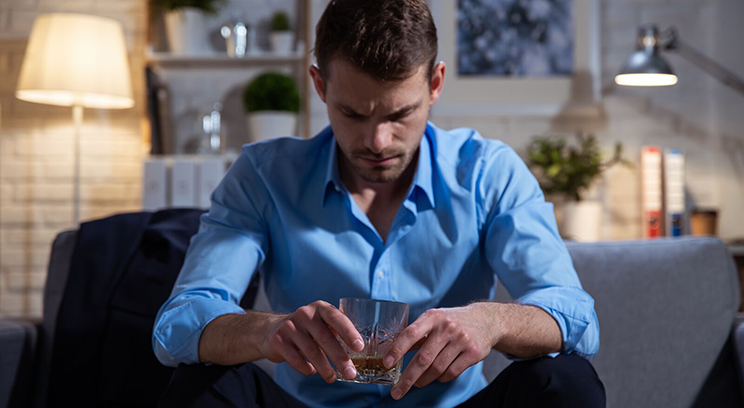The stress of the COVID-19 pandemic saw an increase in self-medication. Research from Bupa Global’s 2020 Executive Wellbeing Index (EWI) found that 52 per cent of those surveyed around the world were using alcohol, drugs or gambling to help them cope with poor mental health and relieve stress.1
Bupa Global’s most recent 2022 EWI shows that while worries around COVID-19 have eased in most countries, mental health remains an area of concern with 89 per cent of people reporting at least one symptom of poor mental health. Disturbed sleep, mood swings, and burnout being the most common symptoms reported.
“Using self-medication to relieve symptoms of stress, anxiety, and depression is widespread and often includes the use of alcohol, illicit drugs, prescription drugs, or over-the-counter medicine” says Dr Robin Clark, Medical Director for Bupa Global and UK. “Choosing to self-medicate might be a response to a specific symptom, for instance, poor sleep, overwhelm, or struggling to relax, or an attempt to manage multiple symptoms.”
“Focusing on the symptom rather than addressing the root cause of a problem will only ever offer limited relief.”
- Dr Robin Clark
The impact of self-medicating
While initially relaxing us by releasing chemicals in the brain that block feelings of anxiety, self-medicating can have a long-term impact on our mental health and wellbeing. ‘Self-medication may offer some relief from symptoms in the short term, however, the use of substances can often lead to other problems, such as physical or psychological dependency’ Dr Robin says. ‘Focusing on the symptom rather than addressing the root cause of a problem will only ever offer limited relief. Drugs can also worsen symptoms over time, for example, alcohol is a mood depressant and certain drugs can induce psychosis or mood disturbance.’
If you’re experiencing symptoms of stress or feeling overwhelmed, making the decision to take positive action can be empowering. Here are some tips that might offer some relief:
Identify stressful situations
“In the longer term, the more complex and meaningful work is to look deeper and address what might be at the root of your emotional response.”
- Dr Robin Clark
An effective first step to managing stress is to identify situations, places or people that may be causing you stress or anxiety. “Making a list can help you recognise what these things may have in common. This can help you feel more able to make decisions about how to move forward. You may find it helpful to talk openly about your concerns, and it may feel necessary for you to take a break from certain people or situations. You may even feel you need to avoid some things altogether, but in the longer term, the more complex and meaningful work is to look deeper and address what might be at the root of your emotional response.”
The mental health benefits of exercise
Regular daily exercise can help to relieve stress. Exercise reduces cortisol (the stress hormone) and increases the production of ‘feel-good’ hormones, such as endorphins.2 If you can combine exercise with being outside in nature, all the better – the evidence keeps building that being in nature is associated with better health and wellbeing.3 Dr Robin says, “There are many health benefits associated with regular exercise, but remember to start small. The important thing is to find something manageable that works for you and that you’ll be able to stick to.”
The importance of social connection
Studies show that people who have strong social connections at work and elsewhere, benefit from improved mental and physical health and decreased depression.4“ When we’re experiencing symptoms of poor mental health, it can be easy to withdraw’, says Dr Robin, ‘but we need to take care not to isolate ourselves as this often makes matters worse. When we are struggling, the benefit of reaching out to trusted friends and spending time with those we care about cannot be overestimated.”
Keeping a daily routine
“The structure and routine of a daily schedule can help us to use our time more efficiently, feel more in control, and can help steer us away from falling into bad habits,’ Dr Robin explains. ‘Your routine could include making regular time for specific activities, being consistent with meal timings, setting a time for exercise or bringing structure to your evening routine. Just remember to start small, don’t try to make lots of changes all at once, and don’t be disheartened if you go off-track – just pick up with it again the next day.”
Meditation for stress relief
Focusing on the breath, through breathing exercises or meditation, can help to slow our heart rate and stimulate the vagus nerve. “Our vagus nerve is part of our parasympathetic nervous system which regulates our body.” Says Dr Robin. “Deep, deliberate breaths and long exhales are a safety signal that the vagus nerve passes on to the body so that it may ‘turn off’ any anxiety and threat responses.”
“Being disciplined can be easier said than done, especially during times of stress, but sticking to self-imposed boundaries can be good for your morale and your sense of agency which can have positive knock-on effects.”
- Dr Robin Clark
Setting clear boundaries and being disciplined
Setting boundaries can help you create a clearer head space. “Remember it’s ok to say ‘no’. Trying to constantly people-please, take on too much, or allowing a blurring of work and home boundaries, can take its toll on our mental health and lead to burnout.” Dr Robin says. “Prioritise making time for yourself and building healthy habits.”
Self-imposed boundaries are equally important. This could mean a ‘digital detox’ in the bedroom to reduce exposure to blue light, and stressful, late-night emails. Dr Robin says, “being disciplined can be easier said than done, especially during times of stress, but sticking to self-imposed boundaries can be good for your morale and your sense of agency which can have positive knock-on effects.
“Also, on the topic of screens in the bedroom - getting a restful night’s sleep can mean you’re more able to manage stress during the day. To improve your chances of getting a good night’s sleep, try avoiding screens in the hour or two before bed and establish a consistent sleeping and waking schedule.”
When to seek help
If you, or someone you know, has been experiencing symptoms of poor mental health which are beginning to affect daily life, it may be time to reach out.
Signs may include:
- Regularly feeling sad or hopeless
- Regularly feeling anxious or overwhelmed
- Regularly feeling angry, or in a low mood
- Struggling to make decisions
- Lack of energy or feeling restless
- Disturbed sleep
- Avoiding contact with friends
It can be difficult to spot the signs that someone is self-medicating their mental health with drugs or alcohol, but we recommend seeking medical help if you notice that you or a loved one is starting to show signs.
This may include:
- Increased reliance on drugs or alcohol to help deal with stressors such as giving work presentations, or making big decisions
- A heightened sense of anticipation – for example if you can’t stop thinking about the drink you’re expecting to have later that day, or if you can’t go a day without drinking or taking a particular substance
- In the case of alcohol, you might notice a restricting pattern – for example people who develop dependency tend to stick to certain drinks
- Increased tolerance – you might notice that it takes a higher dose or more drinks to reach the desired effect
- An impact on appearance or personal habits, for example losing or gaining a lot of weight, losing interest in appearance or personal hygiene, or withdrawing from friends and family. Other people may notice or comment on this too.



